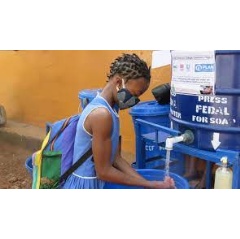Unilever–UK government global hygiene coalition reaches 1 billion people
In response to the Covid-19 pandemic, Unilever and the UK government established a public–private coalition that today celebrates reaching a milestone of 1 billion people with hygiene products, infrastructure and education. We take a look at the impact it has made.
Back in 1894, Unilever helped to improve hygiene with Lifebuoy soap during the cholera epidemic that was sweeping across Victorian England. 126 years later, thanks to the Hygiene and Behaviour Change Coalition (HBCC) created by Unilever and the UK government, Lifebuoy and Domestos, alongside other Unilever hygiene brands, have helped to reach a billion people through HBCC hygiene behaviour programmes.
“Our business has a century-long history of promoting hygiene through our brands, but this unprecedented crisis called for an unprecedented response,” says Rebecca Marmot, Chief Sustainability Officer, Unilever.
Handwashing and hygiene: fundamental measures recommended by public health authoritiesHandwashing and hygiene are two of the most effective, affordable and easiest ways to help reduce the spread of germs. It was with the aim of helping as many people as possible adopt good hygiene habits that the UK government’s Foreign, Commonwealth and Development Office (FCDO) and Unilever jointly launched the £100 million HBCC global effort in March 2020.
Since then, Unilever, with its expertise in hygiene behaviour change and mass media communications, has worked with 21 NGOs and UN partners via the HBCC to implement on-ground programmes and run mass media campaigns, aimed at raising hygiene awareness and teaching hygiene principles.
Unilever’s hygiene brands Domestos and Lifebuoy have a long history of hygiene programming. The HBCC projects have been established using these existing evidence-based programmes, benefiting from proven behaviour-change methodology.
Unilever also led the creation of a bespoke HBCC hygiene campaign: Hands–Face–Space–Surface. The campaign teaches and reminds people of the importance of key hygiene behaviours in the fight against Covid-19. It has been translated into more than 30 languages and will be aired in over 18 countries.
Through HBCC initiatives, over 500,000 handwashing stations have been installed around the world and over 140,000 community health workers and teachers have been trained to deliver information on the importance of correct hygiene practice. More than 75 million Unilever hygiene products, including Domestos bleach and Lifebuoy soap and hand sanitiser, have also been donated and distributed in over 60 countries.
Reaching those most in needThe HBCC was designed to reach populations and communities whose living conditions increased their susceptibility to contracting Covid-19 and other infectious disease. NGO and UN partners were selected based on their experience and expertise in delivering programmes to vulnerable communities, such as refugees.
Working with partners such as the UN Refugee Agency (UNHCR) and the International Rescue Committee (IRC) has allowed the HBCC to establish specialist programmes that can effectively support people living through some of the world’s worst humanitarian crises, including in Cox’s Bazar in Bangladesh. Over 30 million Unilever hygiene products have been donated to UNHCR for direct distribution to refugee communities.
The power of public–private collaborationOf course, the huge scope and the quick deployment of the HBCC programme would not have been possible without the close collaboration of the public and private sectors. Unilever’s partnership with the FCDO, overseen by academic experts in behaviour change and WASH (Water, Sanitation and Hygiene) at the London School of Hygiene & Tropical Medicine (LSHTM), represents the UK’s largest public–private partnership established to help slow the spread of the virus in vulnerable countries.
“Public–private partnership has been critical, allowing us to leverage the influence, expertise and networks of both government and business, and our strong network of NGO and UN partners, at home and overseas. We’re pleased to work together with partners to implement initiatives to address the pandemic at scale,” says Rebecca Marmot, Unilever’s Chief Sustainability Officer.
Hygiene remains critical in months to comeExperts agree that hygiene, alongside free and universal vaccination programmes, will continue to be of fundamental importance in the long-term response to Covid-19. Continued focus on hygiene is especially important where vaccines are not yet available. For countries that are cautiously eyeing post-pandemic life, maintaining focus on hygiene will be vital in helping people continue to live happy, healthy lives.
We know that there are large inequalities in access to hygiene and sanitation. Four in ten people do not have access to soap and water in their homes. It is our hope that one silver lining from this crisis may be recognition at a much greater scale of the vital role hygiene plays in health.
( Press Release Image: https://photos.webwire.com/prmedia/6/272840/272840-1.jpg )
WebWireID272840
This news content was configured by WebWire editorial staff. Linking is permitted.
News Release Distribution and Press Release Distribution Services Provided by WebWire.
